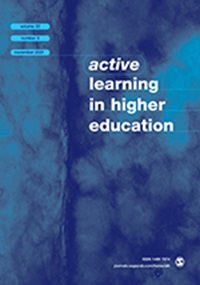Picturing innovation in higher education: A photovoice study of innovative pedagogies
IF 3.8
1区 教育学
Q1 EDUCATION & EDUCATIONAL RESEARCH
引用次数: 0
Abstract
In recent years, higher education institutions have been under increasing pressure to innovate in teaching, research, and learning methodologies. This longitudinal study adopts a participatory research approach, utilizing photovoice techniques, narrative methodologies, and focus groups to explore student perceptions of innovative pedagogies within a specialized Higher Education Institution (HEI). Spanning three academic semesters and involving 43 students from a variety of disciplines, the research integrates photographs and self-authored narratives as data sources. Interpretative Phenomenological Analysis (IPA), in conjunction with photovoice, facilitated a detailed data analysis, revealing four main clusters of pedagogies viewed as innovative by students: “Hero Pedagogies,” highlighting emotional engagement and storytelling; “Community and Solidarity Pedagogies,” emphasizing community involvement; “Sustainable Green Pedagogies,” focusing on sustainability; and “Technology Enhanced Pedagogies,” which utilize technology to improve learning experiences. Students expressed a strong preference for pedagogical strategies that promote emotional connections and incorporate storytelling, stressing the importance of human interaction in the learning process. They also valued approaches that foster community-centered learning, interdisciplinary methods, and experiential education for tackling broader societal and economic challenges. The role of technology in bridging theory with practical application was also underscored. These findings offer insights into effective pedagogical practices by highlighting student-supported approaches. Integrating these innovative pedagogical clusters can enhance the educational experience for institutions, communities, and learners alike, fostering active engagement in the learning journey.描绘高等教育中的创新:对创新教学法的摄影记录研究
近年来,高等教育机构在教学、研究和学习方法方面面临着越来越大的创新压力。本纵向研究采用参与式研究方法,利用摄影选言技术、叙事方法和焦点小组来探讨学生对一所专业高等教育机构(HEI)内创新教学法的看法。这项研究跨越三个学期,涉及 43 名来自不同学科的学生,将照片和自述作为数据来源。解释性现象学分析法(IPA)与摄影选言相结合,促进了详细的数据分析,揭示了学生认为具有创新性的四大教学法:"英雄教学法",强调情感投入和讲故事;"社区和团结教学法",强调社区参与;"可持续绿色教学法",注重可持续发展;以及 "技术强化教学法",利用技术改善学习体验。学生们表示非常喜欢促进情感联系和结合讲故事的教学策略,强调人际互动在学习过程中的重要性。他们还重视促进以社区为中心的学习方法、跨学科方法以及应对更广泛的社会和经济挑战的体验式教育。技术在理论与实际应用之间的桥梁作用也得到了强调。这些发现通过强调学生支持的方法,为有效的教学实践提供了启示。整合这些创新的教学集群可以增强机构、社区和学习者的教育体验,促进他们积极参与到学习过程中来。
本文章由计算机程序翻译,如有差异,请以英文原文为准。
求助全文
约1分钟内获得全文
求助全文
来源期刊

Active Learning in Higher Education
EDUCATION & EDUCATIONAL RESEARCH-
CiteScore
13.20
自引率
12.00%
发文量
31
期刊介绍:
Active Learning in Higher Education is an international, refereed publication for all those who teach and support learning in higher education (HE) and those who undertake or use research into effective learning, teaching and assessment in universities and colleges. The journal is devoted to publishing accounts of research covering all aspects of learning and teaching concerning adults in higher education. Non-discipline specific and non-context/country specific in nature, it comprises accounts of research across all areas of the curriculum; accounts which are relevant to faculty and others involved in learning and teaching in all disciplines, in all countries.
 求助内容:
求助内容: 应助结果提醒方式:
应助结果提醒方式:


